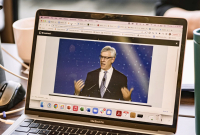Support strong Canadian climate journalism for 2025
Right now, Big Oil and banks like the Royal Bank of Canada are raking in record profits while the rest of us struggle to make ends meet.
Despite publicly committing to the Paris Climate Agreement, banks finance tar sands, gas, coal and oil to the tune of the trillions. Economic insecurity and the climate crisis are deeply intertwined: Big Oil and banks profit off war and disasters while fires, floods and deadly heat endanger our lives and livelihoods.
Now, communities across Canada and North America are paying the costs of the Royal Bank’s misguided fossil fuel financing.
That’s why this year, we’re mobilizing shareholders to prove that continuing to invest in fossil fuels and violating Indigenous rights is not only bad for the planet but bad for RBC’s bottom line.
For the first time ever, shareholders — from retail investors to big pension funds — can harness collective voting power for climate and Indigenous rights resolutions. Our money should not be used to fund the violation of Indigenous rights and climate disasters.
Reports reveal that 88 per cent of individual shareholders historically don’t vote because the process can be opaque and time-consuming. The iconik platform allows average investors voice, accessibility and agency for the first time ever. Anyone can have shares automatically voted to match Stand.earth’s voting profile.
As iconik CEO Alex Thaler puts it: "It’s clear that many of today’s investors care about more than just maximizing the dollar value of their investments. They want to be heard.”
Shareholders across Canada and the U.S. are increasingly demanding that banks stop funding fossil fuel expansion, respect Indigenous sovereignty, and are transparent in disclosing the climate risk of their investments. In January, the New York City comptroller, who manages New York City’s US$242.38-billion pension fund, filed a shareholder resolution at RBC for the bank to set 2030 absolute emissions reduction targets for oil, gas and utility clients.
Despite claiming to be a climate leader, RBC executives like CEO Dave McKay recommended voting against every single climate and FPIC (free, prior and informed consent) resolution ahead of its April 5 AGM.
That’s no surprise considering RBC is Canada’s worst fossil fuel bank and the fifth-worst offender in the world, financing more than $262 billion in fossil fuel companies since the Paris Agreement.
Even though RBC publicly claims to take climate seriously, the truth couldn’t be further from it. RBC continues to finance fossil fuel expansion, including bankrolling projects that violate Indigenous sovereignty, like the Coastal GasLink fracked gas pipeline, which is proceeding in direct opposition to Wet’suwet’en hereditary leadership. This is corporate colonialism in action.
RBC is currently under investigation by the Competition Bureau Canada for allegedly misleading consumers with climate-related advertising while continuing to finance coal, oil and gas so heavily.
The latest reports from the International Energy Agency (IEA) affirm that new fossil fuel projects and financing are “incompatible” with the 1.5 C goal set out in the Paris Agreement. This endangers millions of people in the Global South and climate-impacted communities.
RBC has the opportunity to truly live up to its reputation of corporate purpose, Indigenous reconciliation and meaningful climate action. That means stopping the funding of the expansion of fossil fuels, the Coastal GasLink pipeline, and reinvesting in a just transition for oil and gas workers and communities.
We are paving the way for large-scale, transformative change toward a renewable energy future. And it's working — over the past decade, Stand.earth has joined forces with front-line communities and allied groups to push banks like HSBC, Barclays and the state of New York to divest.
This is about what we fight for: economic justice and collective liberation in a world free from climate chaos and chronic economic instability. This is about investing in climate-safe solutions like the return of Indigenous land, renewable energy, public housing, health care for all, free public transit, and climate reparations for impacted communities. This is about reimagining a democratized financial system that works for all of us.
Royal Bank of Canada might’ve moved its shareholder meeting to Saskatoon, but it should expect a shareholder showdown on April 5.
Batul Gulamhusein is an experienced campaigner, grassroots organizer and facilitator. She works at Stand.earth running digital campaigns demanding that Canada’s biggest bank stops funding fossil fuels, and supporting the Climate Safe Pensions Network to force some of the world’s largest pension funds to divest from fossil fuels. You can learn more about her work at stand.earth/RBC or at batul.ca






Comments
Blessings on stand.earth, and hallelujah!
Hopefully they'll do the same thing with other Canadian chartered banks' shareholders.
Some inconsistency here. I'm all for shareholder resolutions - a powerful tool that should be used a lot. I recall clearly how NGOs bought shares in BC forestry companies some 30 years ago during the "war in the woods", and attended shareholder meetings to demand changes in forestry practices in the province.
Why then is there this major push by universities, pension funds, etc. to divest fossil fuel co, shares vs remaining shareholders and demanding action from oil companies? E.g., if all those universities and other institutions that sold their shares in oil and gas cos. had instead kept them, they could now be crafting shareholder resolutions demanding that the recent windfall profits be used for climate change action, for e.g., As well, look at how BP has recently backed off on its clean energy commitments. It's a shame that there aren't a number of public institutions and universities who own shares in BP demanding that the co. not back off on such commitments, but rather use the recent windfall to increase action on that front.